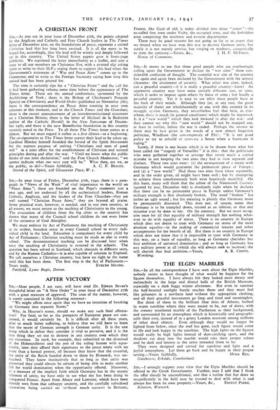AFTER VICTORY
Snt,—Most people, I am sure, will have read Dr. Edwyn Bevan's thoughtful letter on " A New Order " in your issue of December 27th with a great measure of approval. The crux of the matter, however, is surely contained in the following sentence: "We might affirm once again that we have no intention of breaking up Germany into separate States."
Why, in Heaven's name, should we make any such fatal affirma- tion? For fatal, so far as the prospects of European peace are con- cerned, it would certainly be. It is difficult after all these years, after so much bitter suffering, to believe that we still have to learn that the secret of German strength is German unity. It is the one thing which in defeat they consider it vital to preserve, and it is the first thing they set out to destroy in any country over which they are victorious. In 1918, for example, they submitted to the dismissal of the Hohenzollerns and the rest of the ruling houses with equa- nimity, later.they affixed their signatures to the peace treaty with no more than a formal protest, all because they knew that the essential, the unity of the Reich handed down to them by Bismarck, was un- touched. They .knew instinctively that so long as that unity was preserved they could always be certain of being able to make another bid for world domination when the opportunity offered. Moreover, as a measure of the implicit faith which Germany has in the mystic talisman of unity, we have only to see what she has been doing to conquered France. Apart from Alsace and Lorraine, which have been already torn from that unhappy country, and the carefully subsidised separatism being carried on (without much success) in Brittany, France, like Gaul of old, is today divided into three " zones "—the so-called free zone under Vichy, the occupied zone, and the forbidden zone comprising the northern and eastern departments.
There may be good reasons for not going so far as to assert that we intend when we have won this war to destroy German unity, but surely it is not merely unwise, but verging on madness, categorically


























 Previous page
Previous page